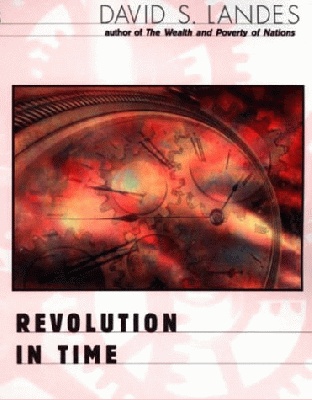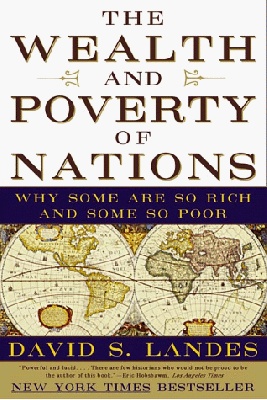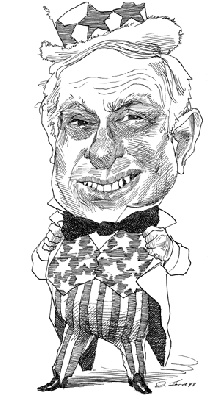

David Saul Landes
* 1924 in New York
test
te
Amerikanischer Wirtschaftshistoriker, Modernisierungstheoretiker und bekennender Eurozentrist, Entwicklungstheoretikerst
Werdegang
1942 B.A., City College, New York
1943 M.A., Harvard University
1953 Ph.D., Harvard University
1952-1958 Professor of Economy an der Columbia University, New York
1957/58 Dozent am Center for Advanced Study in Behavioural Sciences, Stanford
1958-1964 Professor of History and Economy an der University of California in Berkeley
1964-97
Professor an der Harvard University zunächst für Geschichte, zuletzt
Coolidge Professor of History and Professor of Economics
1975 Chair of the Panel on Western European Affairs for the Commission of Critical Choices
1981-93 Chair of Faculty Committee on Degrees in Social Studies, Harvard University
1987/88 Forschungsaufenthalt am Zentrum für Behavioral Sciences, Palo Alto
1997 Emeritierung
1968-1969 Churchill Collgee, Cambridge, UK
1972-1973 Universite Paris-IV
1978 Universität Zürich und Eidgenössische Technische Hochschule Zürich
Mitgliedschaften
American Academy of Arts and Sciences
American Philosophical Society
Associé Fondation Royaumont pour le Progrès des Sciences de l'Homme
British Academy
British Economic History Society
Economic History Association
National Academy of Sciences (USA)
Royal History Society
Societé d'Histoire Modèrne
Senior Fellow of the Society of Fellows, Harvard University
Society for French Historical Studies
Kyk
Journal of Economic History
Journal of Social History
Journal of Interdisciplinary History
Technology and History
Auszeichnungen
1996 Kenan Enterprise Award (25.000$)
Ehrendoktor u.a. der Universität Genf, HEC School of Management, Paris
Primärliteratur
Bücher
Bankers and Pashas: International Finance and Economic Imperialism in Egypt. London: Heinemann 1958.
The
Structure of Enterprise in the Nineteenth Century: The Cases of Britain
and Germany. Berkeley: University of California, Institute of
Industrial Relations 1960.
The Unbound Prometheus: Technological
Change and Industrial Development in Western Europe from 1750 to the
Present. Cambridge: Cambridge University Press 1969.
(deutsch: Der
entfesselte Prometheus. Technologischer Wandel und industrielle
Entwicklung in Westeuropa von 1750 bis zur Gegenwart. Köln: Kiepenheuer
& Witsch 1973). Revolution in Time: Clocks and the Making of the Modern World. New York: W.W. Norton 1983.
Revolution in Time: Clocks and the Making of the Modern World. New York: W.W. Norton 1983.
The Wealth and Poverty of Nations: Why Some Are So Rich and Some So Poor. New York: W.W. Norton 1998.
(deutsch: Wohlstand und Armut der Nationen. Warum die einen reich und die anderen arm sind. Berlin: Siedler 1999.)
Dynasties: Fortunes and Misfortunes of the World's Great Family Businesses. New York: Viking 2006.
(deutsch: Die Macht der Familie. Wirtschaftsdynastien in der Weltgeschichte. München: Siedler 2006.)
Herausgeberschaften
The Rise of Capitalism. New York: Macmillan 1966.
History as Social Science. Englewood Cliffs, NJ: Prentice-Hall 1971 (mit Charles Tilly).
Western Europe: The Trials of Partnership. Lexington, MA: Lexington Books 1977.
Favorites
of Fortune: Technology, Growth, and Economic Development Since the
Industrial Revolution. Cambridge, MA: Harvard University Press 1991
(mit Patrice Higonnet und Henry Rosovsk).
Aufsätze
Entrepreneurial Research in France. In: Explorations in Entrepreneurial History 3.1950, 1. S. 24-34.
The Statistical Analysis of Anglo-American Economic Development. In: World Politics 7.1955, 2. S. 326-336.
Recent Work in the Economic History of Modern France. In: French Historical Studies 1.1958, 1. S. 73-94.
Some Thoughts on the Nature of Economic Imperialism. In: Journal of Economic History 21.1961, 4. S. 496-512.
A
Chapter in the Financial Revolution in the Nineteenth Century: The Rise
of French Deposit Banking. In: The Journal of Economic History 23.1963,
2. S. 224-231.
New-model Entrepreneurship in France and Problems
of Historical Explanation. In: Explorations in Entrepreneurial History
Serie 2, 1.1963, 1. S. 56-75.
Technological Change and
Industrial Development in Western Europe, 1750-1914. In: Habakkuk,
H.J./ Postan, M. (Hrsg.): The Industrial Revolutions and After:
Incomes, Population and Technological Change. Cambridge: Cambridge
University Press 1965. S. 274-601
= The Cambridge Economic History of Europe. Bd. 6, Part 1.
(= Vorstudie zu "The Unbound Prometheus")
Factor
Costs and Demand: Determinants of Economic Growth. A Critique of
Professor Habakkuk's Thesis. In: Business History 7.1965, 1. S. 15-33.
Japan
and Europe: Contrasts in Industrialization. In: Lockwood, William W.
(Hrsg.): The State and Economic Enterprise in Japan: Essays in the
Political Economy of Growth. Princeton: Princeton University Press
1965. S. 93-182.
The Old Bank and the New: The Financial
Revolution of the Nineteenth Century. In: Crouzet, F./ Chaloner, W.H./
Stern, W.M. (Hrsg.): Essays in European Economic History, 1789-1914.
London: Arnold 1969. S. 112-127.
The Nature of Economic
Imperialism. In: Boulding, Kenneth E. (Hrsg.): Economic Imperialism: A
Book of Readings. Ann Arbor, MI: University of Michigan Press 1972.
S.124-141.
Statistics as a Source for the History of Economic
Development in Western Europe: The Protostatistical Era. In: Lorwin,
Val Rogin/ Price, Jacob Myron (Hrsg.): The Dimensions of the Past:
Materials, Problems, and Opportunities for Quantitative Work in
History. New Haven: Yale University Press 1972. S. 53-91.
Bleichreders and Rothschilds: The Problem of Continuity in the Family Firm. In: Rosenberg, C.E. (Hrsg.): The Family in History. Philadelphia: University of Pennsylvania Press 1975.
Religion and Enterprise: The Case of the French Textile Industry. In: Carter, Edward/Forster, Robert/Moody, Joseph (Hrsg.): Enterprise and Entrepreneurs in Nineteenth- and Twentieth-Century France. Baltimore: John Hopkins University Press 1976. S. 41-86.
Palestine Before the Zionists. In: Commentary 61.1976, 2. S. 47-56.
Watchmaking: A Case Study in Enterprise and Change. In: Business History Review 53.1979, 1. S. 1-39.
The
Foundation of European Expansion and Dominion: An Equilibrium Modell.
In: Itinerario. International Journal on the History of European
Expansion and Global Interaction 5.1981, 1. S. 46-61.
Clocks: Revolution in Time. In: History Today, 34.1984, 1. S. 19-26.
Why Are We So Rich and They So Poor? In: American Economic Review 80.1990, 2. S. 1-13.
Does
It Pay to be Late? In: Batou, Jean (Hrsg.): Between Development and
Underdevelopment: The Precocious Attempts at Industrialization of the
Periphery 1800-1880. Genf: Droz 1991. S. 43-66.
Homo Faber, Homo Sapiens: Knowledge, Technology, Growth, and Development. In: Contention 1.1992, 3. S. 81-107, 133-135.
Wohlstand
und Armut: Europa und Asien. In: Fischer, Wolfram (Hrsg.):
Lebensstandard und Wirtschaftssysteme. Studien im Auftrage des
Wissensschaftsfonds der DG-Bank. Frankfurt a.M.: Knapp 1995.
A
Historian Looks at Entrepreneurship. In: Corbetta, Guido/ Huse, Morton/
Ravasi, Davide (Hrsg.): Crossroads of Entrepreneurship. New York:
Springer 2005. S. 75-82.
Why Europe and the West? Why Not China? In: The Journal of Economic Perspectives 20.2006, 2. S. 3-22.
Sekundärliteratur
Crafts,
N.F.R.: Macroinventions, Economic Growth, and "Industrial Revolution"
in Britain and France. In: Economic History Review 48.1995,3. S.
591-598.
DeLong, J. Bradford: Thinking About Wealth and Poverty. A Review of
David S. Landes The Wealth and Poverty of Nations: Why Some Are So Rich
and Others So Poor. 1998. http://econ161.berkeley.edu/Econ _Articles/Reviews/landes.html#anchor2077092
_Articles/Reviews/landes.html#anchor2077092
Kleinewefers, Henner: Methodologische und theoretische Überlegungen zu David S. Landes' "Wohlstand und Armut der Nationen". Freiburg/Schweiz: Universität Freiburg, Seminar für Wirtschafts- und Sozialpolitik 2002.
Kreutzmann, Hermann: Die globale Entwicklungsschere. Retrospektive auf Wohlstand und Armut der Nationen. In: Peripherie Nr. 85/86, 2002. S. 210-222.
McNeill,
William H.: How the West Won. Review of David S. Landes: The Wealth and
Poverty of Nations: Why Some Are So Rich and Some So Poor. In: The New
York Review of Books 45.1998, 7. S. 37-39.
Menzel, Ulrich: Eurozentrismus versus ReOrientierung. In: Ders.:
Paradoxien der neuen Weltordnung. Frankfurt a.M.: Suhrkamp 2006. S.
64-90.
Menzel, Ulrich: David S. Landes (*1924). Der bekennende Eurozentrist. In: eins Entwicklungspolitik Nr. 15-16, 2007. S. 68-71.
Mokyr, Joel: Eurocentricity Triumphant. In:
The American Historical Review 104.1999, 4. S. 1241-1246.
Weblinks
Video-Interview mit David Landes, Fathom Archive, Columbia University, http://www.fathom.com/feature/35068/index.html
Interview mit David Landes in der Weltwoche, 26/ 2003, http://www.weltwoche.ch/artikel/?AssetID=5347&CategoryID=62
Eintrag über David Landes auf der Webseite „Rise of the West", http://www.riseofthewest.net/thinkers/landes01.htm
David Landes Kontaktadresse in Harvard, http://www.economics.harvard.edu/faculty/landes/landes.html
Sonstiges
Persönliche
Informationen über David Landes sind nur schwer zu finden. Im Gegensatz
dazu steht eine umfangreiche Rezeption und Diskussion insbesondere
seines Werks „The Wealth and Poverty of Nations" auch im Netz.
MF